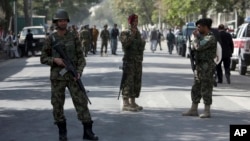Security is tight in the Afghan capital, Kabul, ahead of Monday's inauguration of Ashraf Ghani, who will replace longtime leader Hamid Karzai just before most foreign troops withdraw from the violence-racked country at the end of the year.
Ghani, a former finance minister, was named president-elect after he signed a deal to share power with his opponent, Abdullah Abdullah, which ended months of turmoil and removed an obstacle to the signing of a bilateral security agreement (BSA) with the United States and a “status of forces agreement” (SOFA) with NATO.
International leaders and dignitaries have been invited to the ceremony as the Taliban and allied insurgents seek to launch attacks to scare visitors away and create a mood of insecurity.
Chief executive position
Monday's inauguration will also see presidential candidate Abdullah named chief executive, a post similar to prime minister.
Afghan residents urged both Ghani and Abdullah to work together.
“We expect both (Ghani and Abdullah) to fulfill their promises they gave to the people during campaigning, we the people of Afghanistan are monitoring their performance to see whether they can serve the people or not. They must put in practice their action they should improve people security and economy life,” said Mohammad Sharif, a resident of Kabul.
“If both leaders work together and stand united they will be able to put an end to the corruption and lawlessness but if they don't stay united we believe that their government will repeat the same mistake as the previous government and they will not be able to provide service to the people,” said Ahmadullah Bahawi, a resident of Kabul.
Stability sought
Political analyst Javeed Kohistani said a national unity government could bring stability to the country.
“Considering the current situation, unfortunately Afghanistan is facing security challenges and daily threats," Kohistani said.
"The formation of a national unity government, which brings all parties into the government, particularly the two leading candidates who signed the national unity government, should help bring stability to the country because these two (Ghani and Abdullah) have gained the majority votes of the nation and their government will be a strong government to lead the country,” he added.
Earlier on Sunday, a bomb hit a military vehicle in the diplomatic quarter in Kabul, wounding one person.
Police said no one was killed by the magnetic bomb, which was attached to a military truck in Zanbaq Square, near the vast presidential palace compound and several embassies.
US delegation
John Podesta, counselor to Obama, will be leading the U.S. delegation to the inauguration.
The 10-member delegation includes U.S. Ambassador to Afghanistan James Cunningham and U.S. Army General John Campbell, commander for the International Security Assistance Force.













